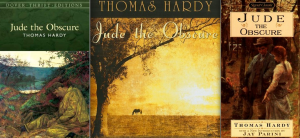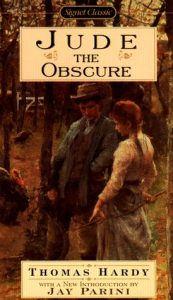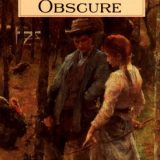Jude the Obscure – Thomas Hardy – 1895

Reviewed by: Paul L. Date: 15 July 2003
I have just finished reading Thomas Hardy’s Jude the Obscure (You can find the entire novel online). This novel was one of the most distressing pieces of work I have ever read. It is little effort to understand the type of reception it must have received in England in the late 1800’s. Most telling was Hardy’s vexation at criticism, that he decided not to write another novel but instead focused on poetry (or so the story goes).
 In this social, and very psychological, novel Hardy explores the limitations placed on both social advancement and love by society and its mores. Hardy keeps ambition and social class as well as love and institutional sanction in constant opposition.
In this social, and very psychological, novel Hardy explores the limitations placed on both social advancement and love by society and its mores. Hardy keeps ambition and social class as well as love and institutional sanction in constant opposition.
I’m not sure I completely acccept the interpretation that Sue was a victim of her times- her ‘moral’ outlook on love vs. marriage defeated, in the end, by society and their harsh condemnation of her attempt to buck status quo. There is a certain fickleness in her that I am all too familar with – and surely my familiarity does not rely on times where a woman crying out against the unfairness of society (as unfair as it may be). But then again, who knows. At least, she is very fragile psychologically- the question remaining is whether her fragility was a consequence of her tragic struggle against soceity, or her struggle against society a tragic consequence of her psychological fragility. Like almost everything in life, its probably a cocktail of the pair.
What grips me the most is Hardy’s depiction of ‘love’. On the continuum of Society’s ability to dicate, shape, and define love, each of the four characters represent some point of acquiescence. Arabella, ever the practical, accepts society’s proscriptions, that is, unless they become obstacles towards her advancement. This stance cause little dissonance because morals are subserviant to gain and social appearances.
The other extreme is not as easily definable – either Jude or Sue. While both theoretically reject society’s yolk – they do so from different perspectives- Sue sees the potential exquisiteness of a relationship between herself and Jude- one that transcends the usual human attachment between male and female- on a visible level one that successfully eschews the physical in preference for the metaphysical:
‘There was a Being whom my spirit oft
Met on its visioned wanderings far aloft …
A seraph of Heaven, too gentle to be human,
Veiling beneath that radiant form of woman.’
-(from Shelley’s Epipsychidion)
Jude, on the other hand, a view not as noble, simply sees the rigidity of social proscription- the asininity of requiring two human individuals, dynamic and changing, to vow eternal love for each other. Here Jude is closer in some respects to Shelley’s Romanticism (as is his romantic ideal of Christminster).
In both cases, Hardy shows how forlorn Romanticism is in a Victorian age.
What hits home for me, is Hardy’s exposing, in all its nakedness the gulf that can separate love and happiness. Both Jude and Sue love with an intensity that does hark back to Romanticism, yet neither are happy.
In Jude the Obscure, Hardy anticipates some of the more far-reaching sociological dilemmas placed before humanity by the 20th century. Of course it is no wonder that in his phophetic role, a certain pessimism abounds. But when dealing in love and academia, a dose of pessimism never does hurt. This book is highly recommended.















